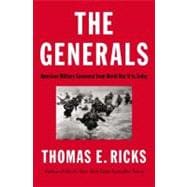
Note: Supplemental materials are not guaranteed with Rental or Used book purchases.
Purchase Benefits
What is included with this book?
CONTENTS
PROLOGUE: Captain William DePuy and the 90th Division in Normandy, summer 1944
PART I
WORLD WAR II
1. General George C. Marshall: The leader
2. Dwight Eisenhower: How the Marshall system worked
3. George Patton: The specialist
4. Mark Clark: The man in the middle
5. “Terrible Terry” Allen: Conflict between Marshall and his protégés
6. Eisenhower manages Montgomery
7. Douglas MacArthur: The general as presidential aspirant
8. William Simpson: The Marshall system and the new model American general
PART II
THE KOREAN WAR
9. William Dean and Douglas MacArthur: Two generals self- destruct
10. Army generals fail at Chosin
11. O. P. Smith succeeds at Chosin
12. Ridgway turns the war around
13. MacArthur’s last stand
14. The organization man’s Army
PART III
THE VIETNAM WAR
15. Maxwell Taylor: Architect of defeat
16. William Westmoreland: The organization man in command
17. William DePuy: World War II– style generalship in Vietnam
18. The collapse of generalship in the 1960s
19. Tet ’68: The end of Westmoreland and the turning point of the war
20. My Lai: General Koster’s cover-up and General Peers’s investigation
21. The end of a war, the end of an Army
PART IV
INTERWAR
22. DePuy’s great rebuilding
23. “How to teach judgment”
PART V
IRAQ AND THE HIDDEN COSTS OF REBUILDING
24. Colin Powell, Norman Schwarzkopf, and the empty triumph of the 1991 war
25. The ground war: Schwarzkopf vs. Frederick Franks
26. The post– Gulf War military
27. Tommy R. Franks: Two- time loser
28. Ricardo Sanchez: Over his head
29. George Casey: Trying but treading water
30. David Petraeus: An outlier moves in, then leaves
EPILOGUE: Restoring American military leadership
ACKNOWLEDGMENTS
NOTES
INDEX
The New copy of this book will include any supplemental materials advertised. Please check the title of the book to determine if it should include any access cards, study guides, lab manuals, CDs, etc.
The Used, Rental and eBook copies of this book are not guaranteed to include any supplemental materials. Typically, only the book itself is included. This is true even if the title states it includes any access cards, study guides, lab manuals, CDs, etc.